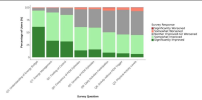Dolphin
Senior Member (Voting Rights)
Now published, see post #3
--------------------------------------------
https://www.researchsquare.com/article/rs-5389182/v1
Wearable Technology in the Management of Complex Chronic Illness: Preliminary Survey Results on Self-Reported Outcomes
Abstract
Chronic illnesses like Long Covid and Myalgic Encephalomyelitis/Chronic Fatigue Syndrome involve fluctuating symptoms, often worsened by exertion. Home monitoring technologies may support symptom tracking and self-management. A survey of 1,301 users of the Visible mobile application found that 77% experienced symptom improvements, 85% felt more in control, and 94% gained better understanding of their energy budget. Home-monitoring-based mobile applications may offer value in managing energy-limiting chronic conditions to achieve better self-management.
Background
Complex chronic illnesses like Long Covid (LC) and Myalgic Encephalomyelitis/Chronic Fatigue Syndrome (ME/CFS) are marked by fluctuating symptoms, often exacerbated by physical, cognitive, or emotional exertion in a phenomenon known as post-exertional malaise (PEM). Home monitoring technologies offer potential benefits by enabling individuals to track symptoms and biometrics, aiding in disease self-management. However, the general effectiveness of such tools is still unknown.
Methods
A random sample of users of the Visible mobile application, aged 18 or older and with self-identified complex chronic illnesses such as LC or ME/CFS, were invited to complete an online survey regarding the impact of the app on their chronic disease self-management. Descriptive statistics related to the responses were analyzed and reported.
Results
The survey was distributed to 2,636 people, with 1,301 participants responding (49.3% response rate). The average age was 46 years, and 82% of respondents were female. Most participants reported having ME/CFS (42%), LC (31%), or both (18%). Of those with at least 30 days of data, 77% saw improvements in symptoms, 85% felt more in control of their illness, and 94% reported a better understanding of their energy budget.
Discussion and Conclusion
Home-monitoring based mobile applications may have utility in helping people with energy-limiting complex chronic illnesses to achieve better chronic disease self-management, and should be considered as a management strategy for people living with these conditions.
--------------------------------------------
https://www.researchsquare.com/article/rs-5389182/v1
Wearable Technology in the Management of Complex Chronic Illness: Preliminary Survey Results on Self-Reported Outcomes
Abbey Sawyer1
Rory Preston2
Harry Leeming2
Luke Martin-Fuller2
Amy Proal3
David Putrino1
1 Icahn School of Medicine at Mount Sinai,
2 Visible Health Inc,
3 Polybio Research Foundation
Abstract
Chronic illnesses like Long Covid and Myalgic Encephalomyelitis/Chronic Fatigue Syndrome involve fluctuating symptoms, often worsened by exertion. Home monitoring technologies may support symptom tracking and self-management. A survey of 1,301 users of the Visible mobile application found that 77% experienced symptom improvements, 85% felt more in control, and 94% gained better understanding of their energy budget. Home-monitoring-based mobile applications may offer value in managing energy-limiting chronic conditions to achieve better self-management.
Background
Complex chronic illnesses like Long Covid (LC) and Myalgic Encephalomyelitis/Chronic Fatigue Syndrome (ME/CFS) are marked by fluctuating symptoms, often exacerbated by physical, cognitive, or emotional exertion in a phenomenon known as post-exertional malaise (PEM). Home monitoring technologies offer potential benefits by enabling individuals to track symptoms and biometrics, aiding in disease self-management. However, the general effectiveness of such tools is still unknown.
Methods
A random sample of users of the Visible mobile application, aged 18 or older and with self-identified complex chronic illnesses such as LC or ME/CFS, were invited to complete an online survey regarding the impact of the app on their chronic disease self-management. Descriptive statistics related to the responses were analyzed and reported.
Results
The survey was distributed to 2,636 people, with 1,301 participants responding (49.3% response rate). The average age was 46 years, and 82% of respondents were female. Most participants reported having ME/CFS (42%), LC (31%), or both (18%). Of those with at least 30 days of data, 77% saw improvements in symptoms, 85% felt more in control of their illness, and 94% reported a better understanding of their energy budget.
Discussion and Conclusion
Home-monitoring based mobile applications may have utility in helping people with energy-limiting complex chronic illnesses to achieve better chronic disease self-management, and should be considered as a management strategy for people living with these conditions.
Last edited by a moderator:

